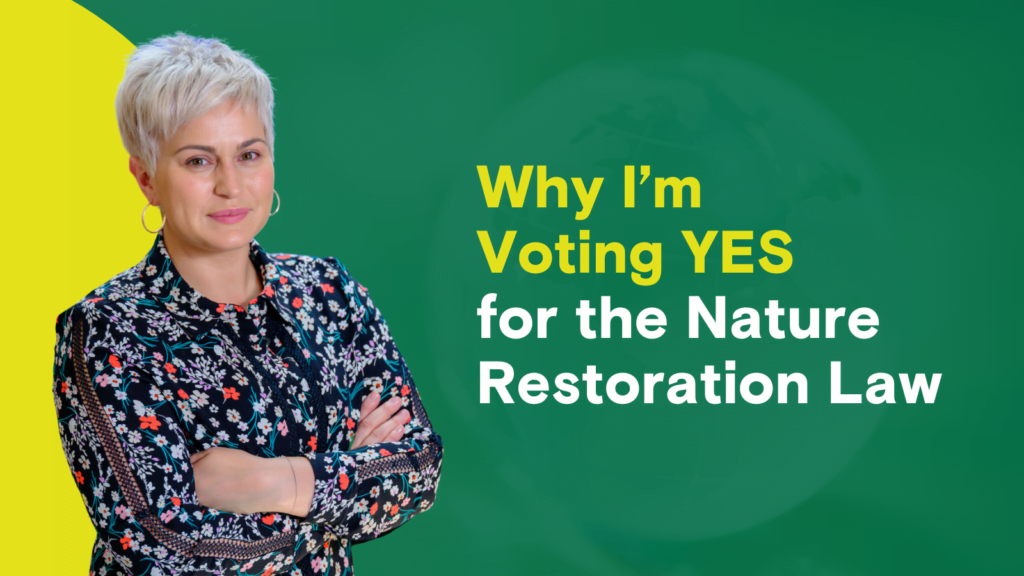
What is the Nature Restoration Law?
The European Commission proposed the Nature Restoration Law, new legislation to restore biodiversity loss across the European Union.
It is the first continent-wide, comprehensive law of its kind and feeds into the EU Biodiversity Strategy.
This Law calls for binding measures to restore degraded ecosystems, restore and store carbon, and prevent/reduce further climate disasters.
According to the Commission Report, 80% of habitats in the EU are in poor condition. The text is calling for restoring wetlands, rivers, forests, grasslands, and marine ecosystems. This Law, if passed, in their eyes, will increase biodiversity, limit global warming to 1.5 degrees, reduce risk of food security and prevent natural disasters.
Why is it so important?
According to the Commission, the Law should ensure measures/targets to cover at least 20% of the EU’s land and sea areas by 2030, and ultimately all ecosystems in need of restoration by 2050.
Personally, it’s important because it is the right thing to do for our environment and biodiversity.
Why has it been so contentious?
It is politically contentious.
What I don’t favour is the shaming and ‘us vs them’ narrative presented by Activists and other MEP’s. I also do not respect the decision by the EPP Group to remove our political Group from negotiations. As parliamentarians, our role is to negotiate, compromise and work for the best of our communities.
My stance? Why this stance?
A Nature Restoration Law is needed.
As of now, I will vote to keep the text alive (vote against the EPP Group).
In several discussions with farmers, young or seasoned, soil health, water quality and their farm, community growth is imperative.
However, I have a number of issues with the Text.
There is no clear legal framework outlined by the Commission or at this point, the Council.
There is rooted confusion, and rightly so, from farmers on several of the lines in the text.
Voluntary or involuntary rewetting of land. Clarity is required on this. I have received confirmation from Minister McConalogue and from the Minister of State Malcolm Noonan that the Irish State have enough State Land to fulfil their 2030 ambitions.
However, when asked for how much State Land will be rewet, and if additional land is needed for 2050 Binded Targets, no clarity has been given.
“New Money” and specific funding or compensation provided to farm families who volunteer their lands to be rewet. Also, is this funding continuous or will it shift in the next CAP?
Clarity is needed from the Council, Commission and the Irish Government. The EU’s MultiAnnual Budget (2021-2028) and the Next Generation EU Funding needs to include the Agricultural Sector.
We keep changing the goal posts, especially for young farmers. It is not good enough that our Young EU Farmers have not received a direct plan from the Agri/Envi Committees in the Parliament, the Irish Government and the Commission/Council.
Voting against the EPP Group?
Yes. I will be voting against the EPP Group line. I will be voting to “reject” the ENVI Committee rejection.
What happens now?
We vote as a European Parliament on Wednesday, July 12th.
We will vote to “support” or “reject” the Committee rejection (ENVI). If this is rejected it returns back to the Commission to ‘develop’ a new text.
Social Media!
It’s important to fact check your social media sources when accessing information about the Nature Restoration Law. But as EU citizens, we all have an interest in this law so I encourage you to keep yourself updated.
Important to also note:
This week also in Plenary we will vote for 4 other Fit for 55 Text. Nature Restoration Law is not the only Green Initiative text we vote for.
As listed on the Commission page, the Implementation is listed as:
“EU countries are expected to submit National Restoration Plans to the Commission within two years of the Regulation coming into force, showing how they will deliver on the targets. They will also be required to monitor and report on their progress. The European Environment Agency will draw up regular technical reports on progress towards the targets. The Commission, in turn, will report to the European Parliament and to the Council on the implementation of the Nature Restoration Law.”

